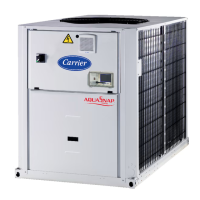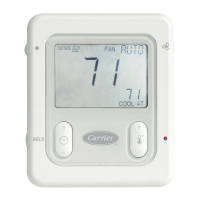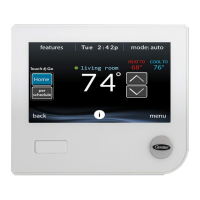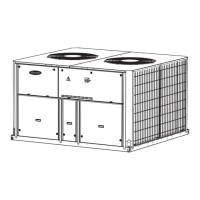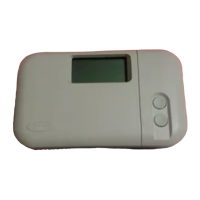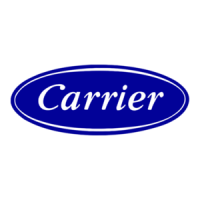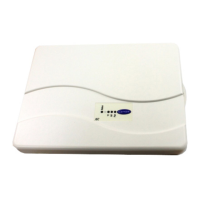6.13 - Free cooling option
Free cooling is a method of using low outside air temperature as
an aid to chilling water that is later used in the air-conditioning
system. Thanks to this option, the energy consumed by the unit
can be reduced depending on the external air temperature, with
the system being most effective when the outdoor air temperature
is below 0°C (32°F).
The outdoor air temperature threshold that triggers the free cooling
cycle can be set by the user in the Configuration menu
(FREECONF – Free Cooling).
The free cooling option requires an additional SIOB board to be
installed.
Free Cooling can be disabled using one of the following
methods:
■ By forcing the Free Cooling Disable ? parameter to "yes" via
the user interface (FC_DSBLE in FREECOOL menu).
■ By forcing the parameter FREECOOL.FC_DSBLE to "yes"
through the Network in Network mode.
■ By switching to "close" the FC_SW input on the FC SIOB board
in Remote mode.
6.13.1 - Free cooling cycle (30RBM/30RQM only)
When operating conditions allow for free cooling, the compressors
are stopped and the 3-way valve is used to prevent the uid from
entering the compressor when the refrigerant pump is running.
The cooling capacity is controlled by opening the electronic
expansion valve (EXV).
The changeover from mechanical cooling to free cooling is
controlled automatically by the control.
The free cooling session may be performed independently on two
circuits at the same time. In case of 30RBP units (only units without
common V-coil for both circuits), it is also possible for one circuit
to operate in mechanical cooling, whereas another one may be
in the free cooling mode. Such a solution helps to optimize the
free cooling operation and ensures that the cooling demand is
satised at any time.
CAUTION: If the unit is in the Free Cooling alarm, the control
will switch back to compressor cooling (mechanical cooling)
and another free cooling session will not be allowed within
the next hour.
6.13.2 - Free cooling mode
The free cooling mode depends on the OAT threshold and Delta
T (minimum difference between the control point and OAT). Higher
Delta T implies higher Energy Efciency Ratio (EER).
EER
Delta T
Mechanical cooling
circuit A / circuit B
Free cooling
circuit A / circuit B
Mechanical cooling
circuit A or circuit B
Free Cooling
circuit A or circuit B
EER: Energy Efciency Ratio
Delta T: Minimum difference between the control point and OAT
To set free cooling OAT threshold
1. Navigate to the Conguration menu.
2. Select Free Cooling Cong (FREECONF).
3. Set OAT Threshold [free_th].
OAT Threshold [free_th]
-35 to 30°C 0°C
-31 to 86°F 32°F
To set minimum Delta T
1. Navigate to the Conguration menu.
2. Select Free Cooling Cong (FREECONF).
3. Set Minimum Delta T [fcdeltat].
Minimum Delta T [fcdeltat]
5 to 10^C 8^C
9 to 18^F 14.4^F
Additionally, the control allows for pre-cooling which means that
free cooling is allowed only when the difference between OAT and
LWT is greater than the minimum Delta T.
To set pre-cooling
1. Navigate to the Conguration menu.
2. Select Free Cooling Cong (FREECONF).
3. Set Pre-Cooling Select [pre_cool].
Pre-Cooling Select [pre_cool]
No/Yes Yes
6.14 - Dry Cooler Free Cooling (DCFC)
30RBM/RBP chillers and 30RQMP/RQP heat pumps may be tted
with a dry cooler that enables power consumption reduction which
amounts to energy and cost savings.
The installation of a dry cooler allows for "free cooling" – a method
of using low outdoor air temperature as an aid to chilling water
that is later used in the air-conditioning system. The system is the
most effective when the outdoor air temperature is below 0°C
(32°F).
This “dry cooler free cooling” mode is enabled when the outside
air temperature ("OAT Free Cooling") is below the water loop
temperature and the service-congured threshold parameter.
NOTE: Dry cooler water loop temperature and free cooling
OAT measured by the control are read-only values that can
be veried in the DC Free Cooling Status menu (DCFC_STA).
The control distinguishes between two types of fan control for a dry
cooler free cooling option, where the rst one embraces the use
of fan staging and the second one that includes the use of variable
speed fan. Mixed conguration can also be used (xed and variable-
speed fan control at the same time).
Dry cooler free cooling is normally stopped when the outside air
temperature ("OAT Free Cooling") is above the water loop
temperature and the service-congured threshold parameter.
However, if it turns out that the cooling power of the dry cooler is
not enough in order to reach the cooling setpoint, then the
mechanical cooling will be started (when FC capacity is at 100%,
then mechanical cooling can be started).
6.15 - Refrigerant gas leak detection option
The control permits refrigerant leak detection. Two additional
sensors that detect the refrigerant concentration in the air must
be installed on the unit.
If one of these sensors detects an abnormal refrigerant level for
more than one hour (timer set by service technicians), the alarm
will be triggered, but the unit will continue to operate.
6 - STANDARD CONTROL OPERATIONS AND OPTIONS
43
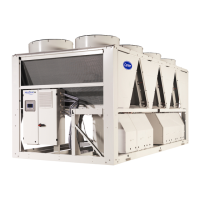
